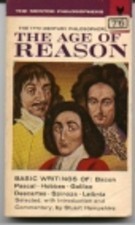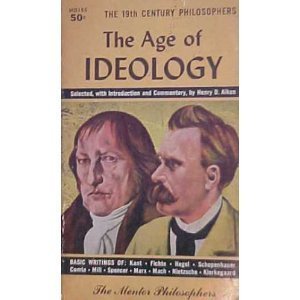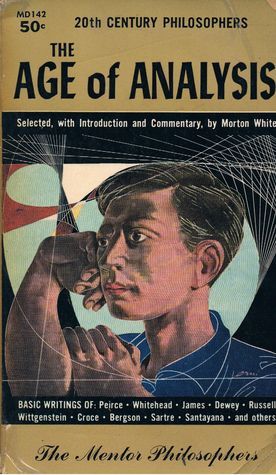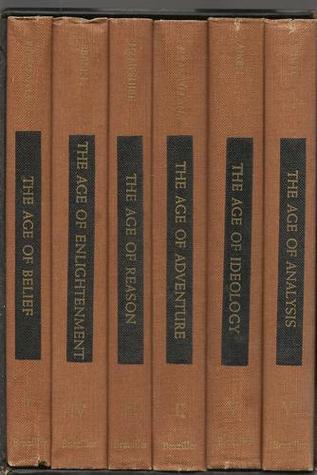


Books in series

The Age of Belief
1954

The Age of Adventure
The Renaissance Philosophers
1956

The Age of Reason
The 17th Century Philosophers
1956

The Age of Enlightenment
The Eighteenth Century Philosophers
1956

The Age of Ideology
1956

The Age of Analysis
Basic Writings
1955

The Great Ages of Western Philosophy in Six Volumes
1957
Authors
Morton White (born 29 April 1917) is an American philosopher and historian of ideas. He is both a central figure in the philosophical movement of Holistic Pragmatism and a noted historian of American philosophical thought. He was a professor in the Department of Philosophy at Harvard from 1953 to 1970, and since then has been at the Institute for Advanced Study in Princeton, NJ where he is currently professor emeritus. White was born in the Lower East Side of New York City. White attended City College of New York as an undergraduate before doing his postgraduate studies at Columbia University, where he completed his Ph.D. in 1942 and was influenced by John Dewey. In 1949 he published Social Thought in America, a critical history of liberal social philosophy as represented by the ideas of Dewey, Oliver Wendell Holmes, Jr., Thorstein Veblen, Charles A. Beard, and James Harvey Robinson. When the book was republished in 1957 he added a preface in which he softened some of his criticisms, and he added an epilogue in which he attacked the religious liberalism of Reinhold Niebuhr and the conservatism of Walter Lippmann. "Time and recent events," he wrote, "have brought the liberal outlook under a very different kind of attack- an attack with which I have no sympathy- and I fear that my own critical observations might wrongly be associated with arguments, positions, and purposes quite foreign to my own." In his 1956 work, Toward Reunion in Philosophy, White attempted to reconcile the pragmatic and analytic traditions in American philosophy. At Harvard, White was a colleague of Willard Van Orman Quine, and the philosophical views of the two are closely related, particularly in their rejection of a sharp distinction between a priori and empirical statements. But White rejects Quine's view that "Philosophy of science is philosophy enough." Using the framework of Holistic Pragmatism, White argues that philosophical inquiry can just as well be applied to cultural institutions beyond science, such as law and art.

Sir Isaiah Berlin was a philosopher and historian of ideas, regarded as one of the leading liberal thinkers of the twentieth century. He excelled as an essayist, lecturer and conversationalist; and as a brilliant speaker who delivered, rapidly and spontaneously, richly allusive and coherently structured material, whether for a lecture series at Oxford University or as a broadcaster on the BBC Third Programme, usually without a script. Many of his essays and lectures were later collected in book form. Born in Riga, now capital of Latvia, then part of the Russian Empire, he was the first person of Jewish descent to be elected to a prize fellowship at All Souls College, Oxford. From 1957 to 1967, he was Chichele Professor of Social and Political Theory at the University of Oxford. He was president of the Aristotelian Society from 1963 to 1964. In 1966, he helped to found Wolfson College, Oxford, and became its first President. He was knighted in 1957, and was awarded the Order of Merit in 1971. He was President of the British Academy from 1974 to 1978. He also received the 1979 Jerusalem Prize for his writings on individual freedom. Berlin's work on liberal theory has had a lasting influence. Berlin is best known for his essay Two Concepts of Liberty, delivered in 1958 as his inaugural lecture as Chichele Professor of Social and Political Theory at Oxford. He defined negative liberty as the absence of constraints on, or interference with, agents' possible action. Greater "negative freedom" meant fewer restrictions on possible action. Berlin associated positive liberty with the idea of self-mastery, or the capacity to determine oneself, to be in control of one's destiny. While Berlin granted that both concepts of liberty represent valid human ideals, as a matter of history the positive concept of liberty has proven particularly susceptible to political abuse. Berlin contended that under the influence of Jean-Jacques Rousseau, Immanuel Kant and G. W. F. Hegel (all committed to the positive concept of liberty), European political thinkers often equated liberty with forms of political discipline or constraint. This became politically dangerous when notions of positive liberty were, in the nineteenth century, used to defend nationalism, self-determination and the Communist idea of collective rational control over human destiny. Berlin argued that, following this line of thought, demands for freedom paradoxically become demands for forms of collective control and discipline – those deemed necessary for the "self-mastery" or self-determination of nations, classes, democratic communities, and even humanity as a whole. There is thus an elective affinity, for Berlin, between positive liberty and political totalitarianism. Conversely, negative liberty represents a different, perhaps safer, understanding of the concept of liberty. Its proponents (such as Jeremy Bentham and John Stuart Mill) insisted that constraint and discipline were the antithesis of liberty and so were (and are) less prone to confusing liberty and constraint in the manner of the philosophical harbingers of modern totalitarianism. It is this concept of Negative Liberty that Isaiah Berlin supported. It dominated heavily his early chapters in his third lecture. This negative liberty is central to the claim for toleration due to incommensurability. This concept is mirrored in the work of Joseph Raz. Berlin's espousal of negative liberty, his hatred of totalitarianism and his experience of Russia in the revolution and through his contact with the poet Anna Akhmatova made him an enemy of the Soviet Union and he was one of the leading public intellectuals in the ideological battle against Communism during the Cold War.